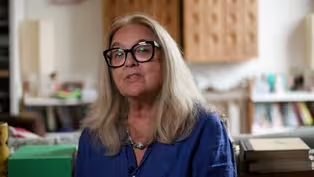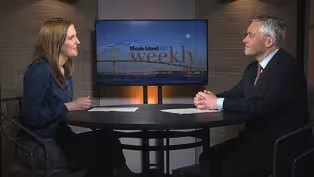
Chronic Absenteeism
Clip: Season 5 Episode 13 | 11m 16sVideo has Closed Captions
Rhode Island educators explain how they’re tackling chronic absenteeism.
The many empty seats in Rhode Island classrooms illustrate the ongoing attendance crisis plaguing school districts. Rhode Island PBS Weekly talks with a student who was chronically absent about why she was out of school for years. Principals also discuss efforts to improve attendance.
Problems playing video? | Closed Captioning Feedback
Problems playing video? | Closed Captioning Feedback
Rhode Island PBS Weekly is a local public television program presented by Ocean State Media

Chronic Absenteeism
Clip: Season 5 Episode 13 | 11m 16sVideo has Closed Captions
The many empty seats in Rhode Island classrooms illustrate the ongoing attendance crisis plaguing school districts. Rhode Island PBS Weekly talks with a student who was chronically absent about why she was out of school for years. Principals also discuss efforts to improve attendance.
Problems playing video? | Closed Captioning Feedback
How to Watch Rhode Island PBS Weekly
Rhode Island PBS Weekly is available to stream on pbs.org and the free PBS App, available on iPhone, Apple TV, Android TV, Android smartphones, Amazon Fire TV, Amazon Fire Tablet, Roku, Samsung Smart TV, and Vizio.
Providing Support for PBS.org
Learn Moreabout PBS online sponsorshipBella Vasquez is not the conventional student.
She's on track to graduate high school next year when she's 21.
- Sometimes it can feel a little discouraging, saying, you know, I'm getting my diploma at 21, but then I realize not everybody goes through the same things in life.
- [Michelle] She attends Nowell Academy in downtown Providence.
She enrolled here after being out of school for more than three years.
She says an unstable living situation in middle school set her on a path of being chronically absent.
In Rhode Island, that means missing 10% or more of the school year.
- I was living, like, between a hotel and my grandmothers, and it was just very overwhelming to think about school while also thinking about, like, where I was gonna end up.
- [Michelle] When she was in 10th grade, she dropped out of Woonsocket High School.
Her mental health, she says, had reached a breaking point.
Over time, Vasquez says she began taking night classes while she worked, but was forced to make a choice.
- My boss came to me and was like, "You know, unfortunately, like, if you wanna keep the job, we do have to change your schedule."
So I made the unfortunate choice to go with work.
- Why did you make the decision to work?
- Because I have always seen what it's been like to have, like, a rocky living situation, being evicted or, like, bouncing back and forth between places, or just the inconsistency of life.
- [Michelle] Vasquez's story isn't all that uncommon at Nowell Academy.
The charter school works with underserved youth between 15 and 22 years old.
Michael Templeton is the school's principal.
- Our students struggle with everything from housing to food insecurity, to transportation, to daycare.
With all of those factors at play, as you can imagine, our work is cut out for us.
- [Michelle] The school has one of the highest rates of chronic absenteeism in Rhode Island.
As of late March, about 85% of students are on track to be chronically absent this school year.
- The data is staggering, right?
And it's not something we are particularly proud of.
At the same time, we recognize that the students that we serve have had historical issues with chronic absenteeism, as far back as kindergarten for many of them.
- [Michelle] Nowell Academy is far from the only school dealing with truancy.
According to a report by the Rhode Island Public Expenditure Council, the proportion of chronically absent students statewide increased from 19.1% in the year before the pandemic to 28.9% in the most recent full school year.
I asked State Education Commissioner, Angelica Infante-Green, the number one reason keeping students out of school.
- The most difficult one to say out loud is that we've sort of gotten used to not coming in every day.
So I think the habit has been broken, and we have to repair that.
- [Michelle] Another factor contributing, the commissioner says, financial stability.
- If there's a choice between working and going to school, there is no choice, right?
We have taken choice away.
Because if you have to pay rent, it is what it is.
- [Michelle] High rates of absenteeism prompted a statewide campaign called Attendance Matters RI.
An online dashboard shows how many students are on track to be chronically absent across the state.
Infante-Green says it's making a difference.
- It is really about a campaign, having people understand, and even business community, you know, don't give a kid working hours when they're supposed to be in school.
Maybe pay 'em a little more so that hour that they miss can be supplemented.
Like, this has to be an all-state approach.
- [Michelle] Governor Dan McKee stressed the importance of being in school during his state of the state address in January, and commended Vasquez for improving her attendance.
- And this year, she's on track and no longer chronically absent.
Bella, Rhode Island is proud of you.
Please stand up and let us recognize you as well.
(audience applauding and cheering) - Vasquez's Day begins early.
She takes the bus from Woonsocket to Kennedy Plaza in Providence and then walks to school.
But she says even the bus is unreliable.
On this day, the bus she initially planned to take was canceled last minute.
She had to wait almost an hour for the next one.
It's a common occurrence, she says, as the Rhode Island Public Transit Authority continues grappling with a years long driver shortage.
What do you do with students who have the best of intentions but still can't make it to school on time for reasons beyond their control?
- Providence has a standing meeting with RIPTA to try to address some of these issues.
So we're trying to figure out, do we have more runs or do we have earlier runs?
What are the things that we could do?
Can we shift some scheduling?
Can some classes start later?
- [Michelle] At Nowell Academy, educators know there are many obstacles that make it difficult for students to come to class.
- Good morning, Gabe.
It's really good to hear from you today.
How are you?
- [Michelle] That's why students are assigned mentors who check up on them in the morning, sometimes through a phone call, other times a text message, reminding them to be at school.
- Just wanted to say we're excited to see you today, and happy Friday.
- [Michelle] On this Friday in February, about half of the students who go to Nowell were absent, and several who did show up were late.
- Why were you late?
Come step right up.
- If they arrive an hour or more after school starts, they're required to leave their cell phones in the main office for the day.
- It's 9:30, which means we gotta have you sign in, and I need to take your phone.
Do you have an alarm?
- Yeah.
- Okay.
Connected to your phone?
We're having conversations with some of the younger students to say, "Have you set your alarm?
What time are you going to sleep at night?"
It's those basic habit kind of things.
- [Michelle] It's a habit also being built at Norwood Elementary School in Warwick, where Principal Sabrina Antonelli prioritizes attendance.
- We do reach out to families directly and send letters home and try to explain to them the importance of attendance.
- The school has seen a big drop in the number of students who miss school excessively, from nearly 40% at this time last year down to about 20% so far this year.
I'm sure a lot of principals are listening to this, wondering, what's the secret sauce?
How have you done this?
- I think there's a lot of things that we do here at Norwood School that make our school a really safe, caring, supportive community environment, where students come and they genuinely want to be here.
- [Michelle] Principal Antonelli says grant money has allowed the school to offer more afterschool programs this school year, which she says is improving attendance.
- So everybody take a nice, deep breath.
- [Michelle] For instance, students interested in acting can work with a member of The Gamm Theatre.
- Now I want you to show me how you would walk around if, oh, you were just so tired.
- [Michelle] Others participate in the Girls on the Run Rhode Island program, designed to blend physical activity with life skill development.
- [Teacher] Who can tell me one thing about the person they're walking with?
- Kids love their programs, and they have to be here to go to their programs.
- [Michelle] Those who aren't here can expect to hear from the school secretary.
- Hi, this is Janice for Jerry.
I'm calling from Norwood.
I know he's been out for a few days, and we just wanted to make sure everything was all right.
- Principal Antonelli says the school also expanded its food pantry to support more families.
Can you explain how the food pantry is helping, if at all, to improve the rates of absenteeism?
- If students' basic needs are met and they feel if they're getting the food they need, they feel nourished, they have clean clothes, they feel more confident, you're more likely to get them here.
- [Michelle] Back in Providence, Vasquez says educators need to recognize being able to attend school is a privilege.
She says many students face more pressing issues.
- A lot of people have stories just like mine, where they have rough living situations, where they're taking care of siblings, or even parents are sick and they have to take care of them.
And I know a lot of kids who had to, like, help support their families.
- What do you make of this notion that for some students, school is a privilege because they need to help support their families?
- We definitely have heard that from a number of kids.
We have to find ways where that isn't the case.
It is a necessity, especially if you've come from a working class family or low income family.
That is your way out.
- Vasquez is dealing with a recent knee injury.
Still, she heads to work at a gas station after school.
She says she has medical bills to pay.
Despite her busy schedule, she says she's the happiest she's ever been.
She has a stable living situation and plans to go to college to study music education.
Do you surprise yourself how far you've come?
- Absolutely.
Sometimes, I really do find myself, like, shedding a tear of happiness, because I never thought I was gonna be here, ever.
And now that I'm beating every single odd that has been put in front of me, it feels amazing.
My Take: Ann Hood – Coping with Grief
Video has Closed Captions
Clip: S5 Ep13 | 6m 46s | Providence-based, best-selling author Ann Hood talks about coping with grief. (6m 46s)
Video has Closed Captions
Clip: S5 Ep13 | 5m 53s | Ted Nesi discusses democracy and why a former state official was ordered to pay a fine. (5m 53s)
Providing Support for PBS.org
Learn Moreabout PBS online sponsorship
- News and Public Affairs

Top journalists deliver compelling original analysis of the hour's headlines.

- News and Public Affairs

FRONTLINE is investigative journalism that questions, explains and changes our world.












Support for PBS provided by:
Rhode Island PBS Weekly is a local public television program presented by Ocean State Media

